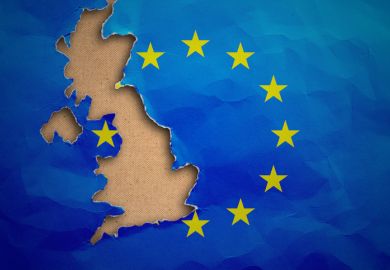The share of European Union research funding going to the UK has dropped significantly since the 2016 Brexit vote, UK government figures reveal.
In September 2016 – the earliest available figures, and three months after the referendum – the UK had won 15.6 per cent of all funding from the multibillion-euro Horizon 2020 research and innovation programme since it launched in 2014, excluding Euratom nuclear research.
According to Times Higher Education analysis of the latest government figures, the UK has received just 13.4 per cent of the roughly €12 billion (£10.4 billion) up for grabs from September 2016 until March 2018, meaning that its record at winning money appears to have worsened significantly since the vote.
The latest figures also show the UK winning a lower share of the “excellent science” pillar of Horizon 2020 since the vote.
This is likely to further raise concerns that uncertainty over the UK’s future in EU framework programmes has made it harder for UK-based researchers to win money from sources such as the European Research Council.
Last September, Universities UK raised the alarm over earlier statistics that showed the beginning of a downturn in success at winning money, and urged universities to clarify to researchers that they were still eligible for money.
Andy Gardner, a reader in biology at the University of St Andrews who won an ERC consolidator grant – worth up to €2 million – last year, said that he knew of a UK researcher who had been encouraged to drop out of a European joint bid “on account of the UK’s limbo status introducing an unwanted element of risk that might make the application less competitive for funding”.
But on the other hand, “my impression is that rather than being dissuaded from applying for ERC funds, many UK researchers have taken a ‘now or never’ attitude and are applying to these funding schemes while that is still an option”, he added.
There have been mixed signals as to whether UK researchers have been shut out of EU funding since the vote. In 2017, UK-based researchers recorded a bumper year for advanced ERC grants, the most lucrative on offer, winning 66 in total and regaining the lead position from Germany.
But other figures show a sharp drop – amounting to half a billion euros – in the value of joint Horizon 2020 projects led by the UK.
There have been particular concerns that Brexit uncertainty will deter European researchers from pursuing a career in the UK. Dr Gardner pointed out that for ERC consolidator grants in 2017, not a single grant winner was choosing to move to the UK to carry out their work. By contrast, other countries including Germany, France, the Netherlands and Switzerland will all benefit from ERC grant-holder immigration.
“I imagine the Brexit vote was strongly discouraging in this respect,” he said.
Register to continue
Why register?
- Registration is free and only takes a moment
- Once registered, you can read 3 articles a month
- Sign up for our newsletter
Subscribe
Or subscribe for unlimited access to:
- Unlimited access to news, views, insights & reviews
- Digital editions
- Digital access to THE’s university and college rankings analysis
Already registered or a current subscriber?








